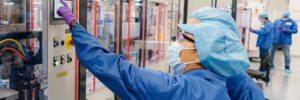Lyten, a supermaterials application company, reports that its automated battery production line consistently exceeds 90% yield, confirming the viability of manufacturing its lithium-sulfur battery using a sulfur cathode and lithium metal anode.
Converting lithium-ion equipment to produce lithium-sulfur batteries in Lyten’s pilot facility required six weeks. Lyten’s lithium-sulfur battery chemistry utilizes no N-methyl-2-pyrrolidone (NMP) in the cathode manufacturing process. The battery contains no nickel, cobalt, manganese, or graphite in the cathode and anode, enabling an entirely locally sourced and manufactured battery.
Lyten’s lithium-sulfur batteries can be produced in standard cylindrical and pouch formats, scaled to automated manufacturing, and use the same equipment and processes as legacy lithium-ion batteries, reducing the risk of producing batteries with higher performance and lower costs than lithium-ion and future solid-state batteries, the company said.
Lyten expects to achieve over 98% yields at scale and will begin delivering commercial lithium-sulfur cells for non-EV customers in aerospace and government applications in 2024 from its San Jose pilot production facility. The company is executing engineering and design, procuring equipment, and evaluating locations to rapidly scale up its manufacturing capacity to meet growing interest from EV, trucking, space, aerospace, and government customers.
“To achieve mass market adoption, lithium-sulfur must be able to be manufactured at enormous scale and at a price immediately on par or better than today’s already scaled-up lithium-ion batteries,” said Celina Mikolajczak, Chief Battery Technology Officer at Lyten. “The complete elimination of NMP and its ability to tolerate metallic contamination and defects creates a cell that is highly manufacturable.”
Source: Lyten
Source: Electric Vehicles Magazine


